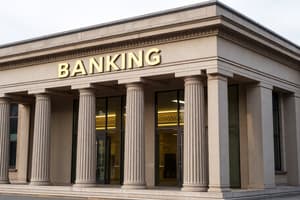Podcast
Questions and Answers
What is the primary function of commercial banks?
What is the primary function of commercial banks?
- To offer deposit, lending, and investment products (correct)
- To manage corporate mergers and acquisitions
- To provide investment advice to large investors
- To underwrite insurance policies
What constitutes the difference between a commercial bank and an investment bank?
What constitutes the difference between a commercial bank and an investment bank?
- Commercial banks serve consumers and small businesses, while investment banks focus on large corporations (correct)
- Commercial banks do not accept deposits, unlike investment banks
- Commercial banks only provide loans, whereas investment banks only handle deposits
- Commercial banks focus on large corporations, while investment banks serve consumers
In a bank's balance sheet, where are liabilities typically displayed?
In a bank's balance sheet, where are liabilities typically displayed?
- On the left-hand side (correct)
- In the footnotes of the balance sheet
- At the bottom of the balance sheet
- On the right-hand side
Which of the following is classified as a bank asset?
Which of the following is classified as a bank asset?
What does bank capital represent?
What does bank capital represent?
Which of these is not a primary type of bank asset?
Which of these is not a primary type of bank asset?
What is typically considered a bank liability?
What is typically considered a bank liability?
Which of the following would be categorized as 'other assets' on a bank's balance sheet?
Which of the following would be categorized as 'other assets' on a bank's balance sheet?
What has been a major trend in banking activities from 1960 to 2018?
What has been a major trend in banking activities from 1960 to 2018?
What is the primary advantage of having bank deposits over other forms of holding funds?
What is the primary advantage of having bank deposits over other forms of holding funds?
What constitutes bank capital?
What constitutes bank capital?
Which of the following does NOT represent off-balance sheet activities for banks?
Which of the following does NOT represent off-balance sheet activities for banks?
Which of the following strategies is NOT a part of managing a bank's assets?
Which of the following strategies is NOT a part of managing a bank's assets?
What primary services do bulge bracket banks offer?
What primary services do bulge bracket banks offer?
What are two typical divisions within investment banks?
What are two typical divisions within investment banks?
Which type of bank risk refers to the inability to meet cash needs?
Which type of bank risk refers to the inability to meet cash needs?
Which type of bank generally focuses on smaller-scale financial deals compared to bulge bracket banks?
Which type of bank generally focuses on smaller-scale financial deals compared to bulge bracket banks?
Which strategy is used to manage credit risk?
Which strategy is used to manage credit risk?
Which of the following best defines the role of corporate advising in investment banks?
Which of the following best defines the role of corporate advising in investment banks?
What do banks do to ensure they meet capital requirements?
What do banks do to ensure they meet capital requirements?
Which of the following is an example of interest-rate risk?
Which of the following is an example of interest-rate risk?
What is one aspect of brokerage services provided by investment banks?
What is one aspect of brokerage services provided by investment banks?
What is a measure banks take to prevent bank failure?
What is a measure banks take to prevent bank failure?
What type of investment bank typically engages in higher-end, specialized consulting services?
What type of investment bank typically engages in higher-end, specialized consulting services?
What is one way investment banks generate revenue?
What is one way investment banks generate revenue?
Which of the following is a risk faced by investment banks?
Which of the following is a risk faced by investment banks?
What does the Capital Adequacy Ratio measure?
What does the Capital Adequacy Ratio measure?
Which statement best describes the asset quality of a bank?
Which statement best describes the asset quality of a bank?
What do the BSP Financial Soundness Indicators measure?
What do the BSP Financial Soundness Indicators measure?
Which term describes the risk that borrowers may fail to repay their loans?
Which term describes the risk that borrowers may fail to repay their loans?
What does shareholder equity represent?
What does shareholder equity represent?
What defines an investment bank’s operations compared to retail banks?
What defines an investment bank’s operations compared to retail banks?
Flashcards
Commercial Bank
Commercial Bank
A financial institution that provides a wide range of services to individuals, businesses, and both.
Balance Sheet
Balance Sheet
A report that summarizes a bank's sources and uses of funds, listing its assets and liabilities at a specific point in time.
Bank Assets
Bank Assets
Anything of value that a commercial bank owns, such as cash, securities, and loans.
Bank Liabilities
Bank Liabilities
Signup and view all the flashcards
Bank Capital
Bank Capital
Signup and view all the flashcards
Reserves
Reserves
Signup and view all the flashcards
Securities
Securities
Signup and view all the flashcards
Loans Receivables
Loans Receivables
Signup and view all the flashcards
Liquidity Risk
Liquidity Risk
Signup and view all the flashcards
Credit Risk
Credit Risk
Signup and view all the flashcards
Interest Rate Risk
Interest Rate Risk
Signup and view all the flashcards
Credit Rationing
Credit Rationing
Signup and view all the flashcards
Monitoring and Restrictive Covenants
Monitoring and Restrictive Covenants
Signup and view all the flashcards
Diversification
Diversification
Signup and view all the flashcards
Liquidity Risk
Liquidity Risk
Signup and view all the flashcards
Off-Balance Sheet Activities
Off-Balance Sheet Activities
Signup and view all the flashcards
Loan Commitment
Loan Commitment
Signup and view all the flashcards
Standby Letter of Credit
Standby Letter of Credit
Signup and view all the flashcards
Loan Sales
Loan Sales
Signup and view all the flashcards
Investment Banks
Investment Banks
Signup and view all the flashcards
Corporate Advising
Corporate Advising
Signup and view all the flashcards
Brokerage Division
Brokerage Division
Signup and view all the flashcards
What are investment banks?
What are investment banks?
Signup and view all the flashcards
How can investment banks lose money?
How can investment banks lose money?
Signup and view all the flashcards
What is the capital adequacy ratio?
What is the capital adequacy ratio?
Signup and view all the flashcards
What are financial institutions?
What are financial institutions?
Signup and view all the flashcards
What does the Foreign Currency Deposit Unit do?
What does the Foreign Currency Deposit Unit do?
Signup and view all the flashcards
What is the NPL Ratio?
What is the NPL Ratio?
Signup and view all the flashcards
What factors influence bank profitability?
What factors influence bank profitability?
Signup and view all the flashcards
What is a Balance Sheet?
What is a Balance Sheet?
Signup and view all the flashcards
Study Notes
Financial Institutions and Intermediaries
- Commercial banks provide deposit, lending, and investment products to individuals and businesses.
- Investment Banks offer services to large corporations and institutional investors.
- Credit Unions, Insurance Companies, and Central Banks are also examples of financial institutions.
- Depository institutions such as banks, savings and loan associations, mutual savings banks, and credit unions receive deposits.
Commercial Banking Basics
- Commercial banking institutions provide financial services in a marketplace for deposits, lending, and investments.
- Commercial banks work with individuals, businesses, and cooperative banks.
- Investment banks, brokerage firms, thrift institutions, mortgage companies, and regional rural banks are related institutions.
Types of Intermediaries
- Depository Institutions: Commercial banks collect deposits and provide loans. Savings and loan associations and credit unions also accept deposits.
- Contractual Savings Institutions: Life insurance companies and fire/casualty insurance companies receive premiums and invest. Pension funds and retirement funds accept employer and employee contributions.
- Investment Intermediaries: Mutual funds, hedge funds, finance companies and money market mutual funds deal with shares, bonds, and other securities.
Investment Banks vs. Commercial Banks
- Commercial banks work with many clients and usually offer a better work-life balance with less demanding work hours and salaries compared to investment bankers.
- Investment banks serve a smaller, niche clientele, focusing on large corporations and institutional investors, requiring longer work hours and higher pay.
Commercial Bank Functions
- Primary Functions: Accepting deposits, granting loans, and creating credit.
- Secondary Functions: Acting as an agent, providing overdraft facilities, discounting bills of exchange, offering locker facilities, and issuing traveler's cheques.
Bank Balance Sheet
- A bank balance sheet summarizes a bank's financial position at a specific point in time.
- Assets: Represents things the bank owns of value that can easily convert to cash (e.g., cash, loans, securities).
- Liabilities: Bank owes to others (e.g., deposits, borrowings).
- Capital: The difference between the bank's assets and its liabilities. It's a measure of the bank's financial strength.
Bank Assets
- Bank assets represent items of value owned by the bank, acquired from funds received from depositors, borrowings, shareholders' investments, or retained earnings.
- These include reserves and cash, securities, loans receivable, and other assets.
Bank Liabilities
- Bank liabilities refer to obligations or debts the bank owes to others.
- This includes demand deposits, non-demand deposits, and borrowings.
Illustrative Case
- This case shows a bank's balance sheet detailing assets and liabilities in millions of Philippine Pesos.
Philippine Banking Industry
- The banking system outlook is positive due to strong macroeconomic performance, ample liquidity, and rising capital buffers.
- The industry benefits from the growing economy and technological innovations.
BSP Financial Soundness Indicators
- Capital Adequacy Ratio is a key indicator for financial institution robustness which shows a bank's ability to withstand economic shocks.
- The stability of the Philippine Banking system is affected by global market conditions or policy actions from advanced economies that often impact global interest rates.
Recent Trends in the Philippine Financial System
- Total assets of the Philippine banking system increased in March 2024, surpassing the pre-pandemic average.
- The growth of the loan portfolio closely mirrors increases in other financial elements, including assets.
- The real estate sector remains the largest borrower within the Philippine banking sector.
Off-Balance Sheet Activities
- Activities such as loan commitments, letters of credit, loan sales, and trading activities don't directly impact the balance sheet because they don't add to assets or liabilities.
Investment Banks
- Investment banks provide more complex financial services than retail banks.
- They assist in the sale of securities in the primary market.
- Securities brokers and dealers handle secondary trading.
Types of Investment Banks
- Bulge Bracket Banks provide broad financial services, including asset management.
- Middle-Market Banks provide services relating to financial markets including equity and debt.
- Boutique Banks specialize in regional or specific financial areas.
Studying That Suits You
Use AI to generate personalized quizzes and flashcards to suit your learning preferences.




